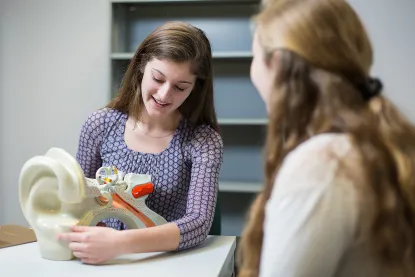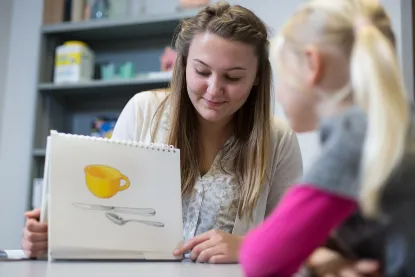
Program overview
One out of every 10 people has a speech, language or hearing problem. Students enrolled in the Speech, Language, and Hearing Sciences program share the common interest of helping others overcome these issues. As a graduate of the program, students are well prepared to enter graduate school in speech-language pathology or audiology due to the clinical training opportunities that are uniquely emphasized at the undergraduate level at NMU.
Undergraduate programs
Undergraduate students at Northern Michigan University have the option of working on an academic major in speech, language and hearing sciences or an academic minor.
Graduate program
The Master of Science in Speech-Language Pathology is a full-time, two-year graduate program designed for students who have completed an undergraduate degree and are seeking advanced training to become skilled professionals in the field. This program builds on foundational knowledge and provides the clinical and academic preparation necessary for a career in speech-language pathology.
Course requisites for students entering practicum courses

Where a career in speech, language, and hearing sciences can take you
Speech, language, and hearing sciences majors are qualified to pursue a wide variety of careers in the treatment, diagnosis and research of speech, language and hearing sciences. These careers can take individuals to research labs, schools, hospitals, rehabilitation clinics, nursing homes or private practices anywhere in the world.
The career outlook for this occupation is steadily improving as the population begins to grow and live longer. The U.S. Bureau of Labor anticipates a 18% increase in anticipated job openings by the year 2033, as parents and teachers are beginning to recognize that many more children than previously thought are affected by speech, language and hearing disorders. The aging population will result in an increase of speech and language impairment due to strokes, brain injuries, and hearing loss.
The Speech, Language, and Hearing Clinic
The Speech, Language, and Hearing Clinic is part of NMU’s Speech, Language and Hearing Sciences Program and the School of Clinical Sciences. It's where we train undergraduate students to become speech-language pathologists.
All services at the clinic are provided by our students under the direct supervision of faculty who are certified by the American Speech-Language-Hearing Association. Our policies and procedures have been put into place to assure that each client’s experience in the clinic is highly productive and that we are able to offer the very best quality services to our patients.

Coming Soon! Speech-Language Pathology Graduate Program
Stay tuned for details about NMU's upcoming Master of Science in Speech-Language Pathology graduate program. For more information or to be notified when the program launches, please contact Heather Isaacson at MSSLP@nmu.edu.
Bachelor of Science
Completion of the undergraduate Bachelor of Science degree in speech pathology and audiology prepares the student for the graduate level education needed to work in either field. An overall GPA oabove a 3.0 is needed to successfully apply to these graduate programs. A master's degree in speech-language pathology or a doctoral degree in audiology is the entry-level requirement for certification as a professional.
In the first year of study, students focus primarily on the basic university educational requirements for the granting of a bachelor's degree. Examples of coursework that may be taken beginning at the start of the freshman year are:
- Introductory level courses in biology, statistics, and physics or chemistry
- Linguistics and technical compositional writing
- A social science course, such as Introduction to Psychological Science
Students in the Speech, Language, and Hearing Sciences program will take introductory coursework in speech, language and hearing. Courses relate to topics such as anatomy and physiology of the speech and hearing mechanism, hearing science, speech science, articulation, hearing, language and fluency disorders, and aural rehabilitation.
Videotaped and live observation experiences are a required part of the undergraduate program. Opportunities are provided for supervised clinical practicum experiences at the undergraduate level at the NMU Speech, Language and Hearing Clinic. Observation of clinical activities precedes actual participation in clinical assignments. Early and frequent advising by a program advisor is necessary because coursework, both inside and out of the department is sequential, with many prerequisite requirements.
Near the end of the four years of undergraduate education, students should apply for a master's degree program in speech-language pathology (SLP), or a professional doctoral degree program in audiology (Au.D.)
To meet requirements for the Certificate of Clinical Competence in speech-language pathology or audiology granted by the American Speech-Language-Hearing Association (ASHA), the student will need to earn a master's degree or doctoral degree. Therefore, four years of undergraduate study is the pre-professional training to prepare for graduate education.
Undergraduate Minor
Northern Michigan University's undergraduate minor in speech, language and hearing sciences requires a minimum of 20 credit hours and may be of particular interest to students involved in several related cognate areas, including: biology, chemistry, communication arts and sciences, engineering, linguistics, music therapy, vocal music, occupational therapy, nursing, psychology and social work. Pre-professional studies in such curricula as pre-dentistry and pre-medicine can also be augmented meaningfully through inclusion of studies in human communication science and disorders, with particular reference to the study of anatomic, physiologic, neurologic, psycho-social and physical bases of speech, language and hearing.
National Student Speech Language Hearing Association (NSSLHA)
The National Student Speech Language Hearing Association (NSSLHA) is a student organization at NMU. NSSLHA's mission is to provide the students in the Speech, Language and Hearing Sciences major and minor with the opportunity to work with a variety of different cultures and ages.
Some key features of the group include:
- Weekly membership meetings
- Monthly story hour at the Peter White Public Library with community youth
- Involvement in the annual Make a Difference Day and Dyslexia Walk
- Assistance with NMU's Speech and Hearing Clinic
Other examples of things this group has been involved with in the past include Adopt-a-Family, Shoe Boxes for the Homeless, Big Brothers/Sisters Lunch Buddies, bingo at the Norlite Nursing Center, winter apparel drive, a continuous food drive for the local Salvation Army and many other activities.
Follow along with this group on Facebook, Instagram and the web.

The American Speech Language-Hearing Association (ASHA)
The American Speech Language-Hearing Association (ASHA) is the professional, scientific and credentialing association for more than 118,000 members and affiliates who are audiologists, speech-language pathologists, and speech, language and hearing scientists.
SLHS Program Mission
The Speech, Language, and Hearing Sciences Program offers an undergraduate program that emphasizes human communication processes in a culturally diverse society. Baccalaureate graduates are able to experience success in their chosen careers, professions or graduate studies.
Mission goals are accomplished through:
- The provision of academic training that will lead to acceptance in and successful completion of a graduate degree in speech-language pathology or employment in chosen field.
- The provision of academic service learning opportunities that will broaden community interaction in the undergraduate academic experience.
SLHS Program History
In 1965, what has been called Speech, Language, and Hearing Sciences since 2006 was listed as an experimental major in teacher certification programs. By 1973, speech pathology and audiology had become its own department, becoming independent of the Speech Department, which included theatre, speech, interpretation, broadcasting and speech education. The Speech Pathology and Audiology Department was located in Carey Hall. In 1975, a name change occurred when Speech Pathology and Audiology became known as Communication Disorders.
At one time, the department prepared both undergraduate- and graduate-level speech pathologists to assume professional responsibilities in a variety of clinical work settings. Now, the program focuses on preparing undergraduate students for graduate school, field work and certification by the American Speech-Language and Hearing Association.
Source: Page 94 of A Sense of Time by Russell Magnaghi.
Possible Job Opportunities
Speech-language pathologists evaluate and treat communication, cognitive and swallowing disorders. These professionals help those who stutter increase their fluency and help those who have had strokes or brain trauma regain their abilities. They also consult with the teachers and families of the patients, to help them adjust to the presence of the disorder.
Speech-language and hearing scientists conduct research on the complex process underlying human communication. They also explore the impact of psychological, social and psycho-physiological communication. These scientists collaborate with experts in other fields to develop new approaches to treating those with speech, language and hearing disorders.
These professionals are self-employed and not employees; that is, these professionals are not an employee of an individual, organization, agency, or other entity providing clinical or consultative services and set their own work hours. They provide services across the life span in communication, cognitive, and swallowing disorders.
The academic and research career of a university professor has three major job responsibilities: teaching, research, and service. This career allows you to prepare the next generation of professionals, make new discoveries and contribute new knowledge to the profession. A university professor also provides service and leadership to committees, advisory boards and professional organizations at the local, state and national level.
